Key events were occurring in Israel within the religious and political hierarchies, and the events were not positive. In our last study, the discussion between a Jewish leader and John the Baptist’s disciples revealed that the tea kettle was heating. Something was about to blow (John 3:25-36). That Jewish leader had told John’s disciples that Jesus’ popularity was increasing. This revealed that the religious leaders were watching both John and Jesus, and they were not happy. King Herod was unhappy with John the Baptist because John had accused him of the sin of living with his brother’s wife; the Jewish leaders also took offense at his rebuke of them (Matthew 3:7-10). Since one of their own, Nicodemus, had visited Jesus, it is obvious that there were some among the Jewish leaders who were starting to be convinced that Jesus might be the Messiah. Jesus’ popularity was growing greater, and John’s popularity was declining. The Jewish leaders were worried. Trouble was brewing just like a good cup of tea. Both John and Jesus were headed for trouble.
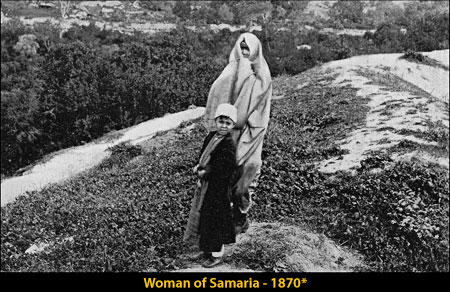
Time To Leave
Jesus was aware of these events, and He knew that the Pharisees had heard that He was baptizing more people than John.
Therefore when the Lord knew that the Pharisees had heard that Jesus was making and baptizing more disciples than John (although Jesus Himself was not baptizing, but His disciples were), He left Judea and went away again into Galilee. And He had to pass through Samaria. John 4:1-4 (NASB)
Contrary to the English words, the Greek language reveals that Jesus was doing some of the baptizing – but not all of it. His disciples were doing most of the baptizing. Jesus knew that the Pharisees were concerned about His popularity, so He left Judea and passed through Samaria on His way to Galilee. Matthew 4:12 and Mark 1:14 tell us that John had been thrown into prison just before Jesus left for Galilee. Only the gospel of John states that Jesus passed through Samaria first. So with John in prison and the Pharisees worried about Him, Jesus left Judea to avoid trouble.
So He came to a city of Samaria called Sychar, near the parcel of ground that Jacob gave to his son Joseph; and Jacob’s well was there. So Jesus, being wearied from His journey, was sitting thus by the well. It was about the sixth hour. John 4:5-6 (NASB)
As Jesus passed through Samaria, He came to the city of Sychar and rested at a well known as Jacob’s well.
The Samaritans lived in the central region of Israel which is above the region known as Judea. The Samaritans had been deported by the Assyrian army in 721 B.C. to foreign lands where they eventually intermarried with the Gentile nations. When they returned to the land, the Judeans rejected their offer to help rebuild the temple in Jerusalem. In short, the Judeans were offended that they had married Gentiles. Years later the Samaritans built their own temple at the base of Mount Gerizim which is near the city of Shechem. Mount Gerizim is about 25 miles (40 Km) north of Jerusalem. When this occurred, a severe split took place between the Judeans and Samaritans.
As often happens when strong differences exist between groups of people, the Judeans hated the Samaritans; and the Judeans started avoiding the region of Samaria. In fact, they would walk around Samaria by crossing the Jordan River and walking northward on the east side of the Jordan River in order to avoid contact with Samaritans. But not Jesus! We are told that Jesus “had to” pass through Samaria.
The Greek language tells us that Jesus had been tired for a long time. It appears that even though He was very tired, He continued onward. He was pushing Himself. His goal was to reach Sychar and stop at Jacob’s well at the sixth hour in order to meet a Samaritan woman. The sixth hour was noon according to Jewish time
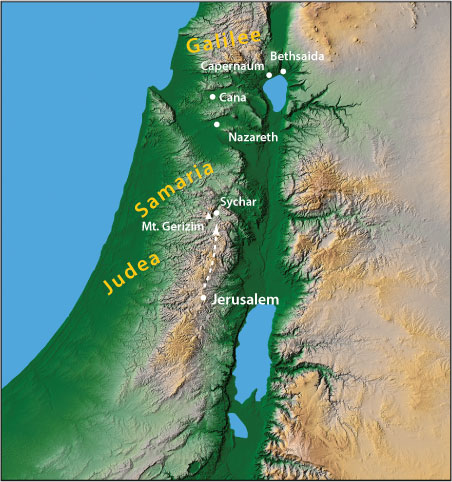
Capturing Her Attention
Jesus had hurried that morning in order to meet the woman that He now saw approaching.
There came a woman of Samaria to draw water. Jesus said to her, “Give Me a drink.” For His disciples had gone away into the city to buy food. John 4:7-8 (NASB)
With His disciples out of the way, Jesus was free to talk with this Samaritan woman. Just imagine – Jesus was going to talk with a Samaritan woman! For a Judean this was amazing, but not for Jesus. The woman was surprised. As we will see in a minute, she appears to be hurt. Maybe this was due to the arrogance of the Judeans toward the Samaritans.
Therefore the Samaritan woman said to Him, “How is it that You, being a Jew, ask me for a drink since I am a Samaritan woman?” (For Jews have no dealings with Samaritans.) John 4:9 (NASB)
Notice that the Judeans, or Jews, had nothing to do with Samaritans. The Holy Spirit does not say that the Samaritans had nothing to do with Judeans. This is a picture of one group of people hating another. We will see later in verse 27 that Jesus’ disciples would not have spoken with this woman. Racism or hatred is not new. It has been around a long time. But Jesus did not hate this woman. Jesus did not care if she was living on the north side of Judea or on the south of Galilee. Jesus did not care if she believed differently than He did or worshipped at Mt. Girizm and not in Jerusalem. No, Jesus wanted to speak with her! He had hurried to speak with her. He wanted to show her that God loved and cared for her.
Jesus answered and said to her, “If you knew the gift of God, and who it is who says to you, ‘Give Me a drink,’ you would have asked Him, and He would have given you living water.” She said to Him, “Sir, You have nothing to draw with and the well is deep; where then do You get that living water? You are not greater than our father Jacob, are You, who gave us the well, and drank of it himself and his sons and his cattle?” John 4:10-12 (NASB)
So Jesus made a statement that captured her attention. She did not know who He was or what He was offering. She did not know that He offered her “living water.” But this woman was cold hearted and emotionally strong. She did not ask for His “living water.” Instead she challenges Him. First, Jesus had nothing to draw with and, second, the water was deep. She was correct. The well was once 100 ft (31 m) deep, but today the well is 75 ft (23 m) deep. She challenged Him with the obvious and then insulted Him with, “You are not greater than our father Jacob, are You . . .?” She was not kind and gracious. She was rude and insulting. Yet, Jesus is kind,
Jesus answered and said to her, “Everyone who drinks of this water will thirst again; but whoever drinks of the water that I will give him shall never thirst; but the water that I will give him will become in him a well of water springing up to eternal life.” John 4:14-15 (NASB)
Do I want that “living water”? Do I want that “eternal life”? Those are the questions that she did not ask. She was not interested yet. She did not understand. Instead she asked for an eternal flow of physical water so that she did not need to return to the well.
The woman said to Him, “Sir, give me this water, so I will not be thirsty nor come all the way here to draw.” John 4:15 (NASB)
As far as she was concerned, this man was just some Jew from Judea. Jesus had not told her who He was. She had not asked. She knew nothing about Him. As far as she knew, He was just a strange Jew who should not be talking to her. He spoke of strange things, and He seemed to think He was more important than Jacob. She did not consider Him to be a spiritual man. She did not understand who was talking to her, and so she was rejecting His message. The same is true today with most people. When people do not consider us to be spiritual men or women, they will reject our message. And some will not understand that we are speaking of spiritual truth.
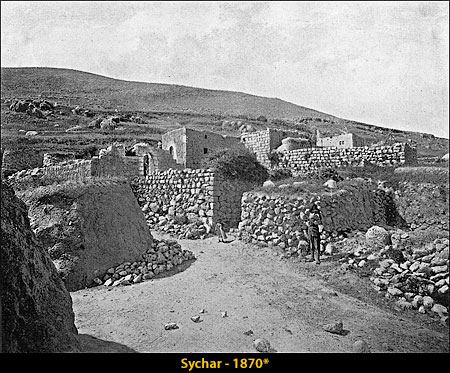
Confidence In The Man
Jesus understood that He now had her attention. She was not insulting Him, but she did not respect Him as a holy man. So He changed His approach and surprised her with a comment.
He said to her, “Go, call your husband and come here.” The woman answered and said, “I have no husband.” Jesus said to her, “You have correctly said, ‘I have no husband’; for you have had five husbands, and the one whom you now have is not your husband; this you have said truly.” John 4:16-18 (NASB)
Go, call your husband. She was surprised with that comment, and strongly responded that she did not have one. Jesus had opened the door into her private life and she objected. But she had no idea what was coming next. “. . . you have had five husbands . . . the one whom you now have is not your husband . . .” What went through her mind? How did she feel? Did she wonder how He knew? She was beginning to understand that He was not an ordinary man.
The woman said to Him, “Sir, I perceive that You are a prophet. Our fathers worshiped in this mountain, and you people say that in Jerusalem is the place where men ought to worship.” John 4:19-20 (NASB)
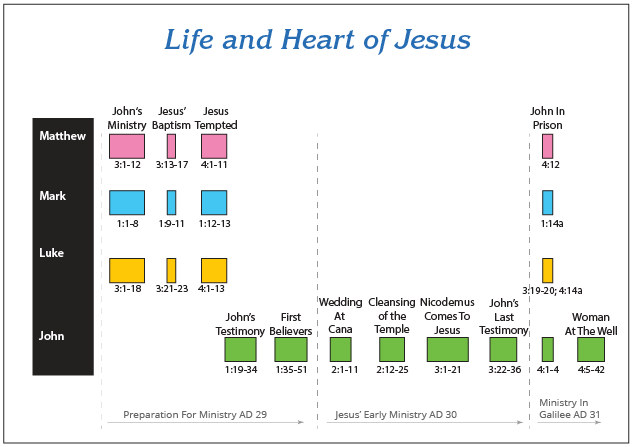
She was putting the puzzle together. His statements about “living water,” “eternal life,” and now knowledge about her private life had finally convinced her that He was a prophet.
Jesus said to her, “Woman, believe Me, an hour is coming when neither in this mountain nor in Jerusalem will you worship the Father. You worship what you do not know; we worship what we know, for salvation is from the Jews. But an hour is coming, and now is, when the true worshipers will worship the Father in spirit and truth; for such people the Father seeks to be His worshipers. God is spirit, and those who worship Him must worship in spirit and truth.” John 4:21-24 (NASB)
What Jesus said next ignores what the Jews in Judea believed and what the Samaritans believed. Worship was not defined by a special place such as in Jerusalem or at Mount Gerazim. Instead, the worship that God looks for comes from the heart. True worship is done in spirit and truth. God looks at the heart and not at the form.
We have a funny idea about worship, just as the Jews and the Samaritans did. Worship does not occur only when the organ, piano, guitars, flute, violin, or drums play. Worship is not just singing and Christian mood music. Worship originates only in the heart. Worship is not hindered or motivated by form. Worship does not depend upon the instruments that are playing or the “worship leader.” In fact, true worship can occur throughout the “Worship Service” because true worship occurs in spirit and truth. True worship can occur both while we sing and while the Word of God is taught.
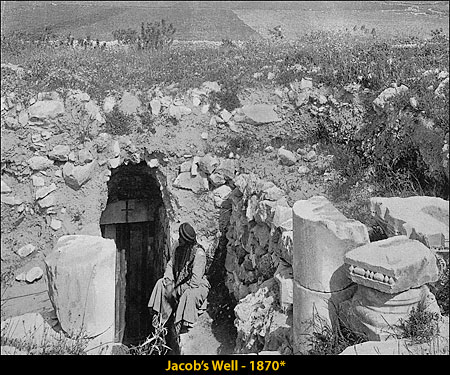
Puzzle Put Together
This woman was stunned once again. She appeared not to be sure about His statement, so she made this comment,
The woman said, “I know that Messiah” (called Christ) “is coming. When he comes, he will explain everything to us.” John 4:25 (NASB)
She seemed to be saying, “I am not sure who you are, but I know One who will tell us the truth!”
Then Jesus declared, “I who speak to you am he.” John 4:26 (NASB)
Jesus made the statement of statements. Jesus clearly said that He is the Messiah. If anyone ever says that Jesus never claimed to be the Messiah, show them this verse.
Just then his disciples returned and were surprised to find him talking with a woman. But no one asked, “What do you want?” or “Why are you talking with her?” Then, leaving her water jar, the woman went back to the town and said to the people, “Come, see a man who told me everything I ever did. Could this be the Christ?” They came out of the town and made their way toward him.”John 4:27-30 (NASB)
Message + Godly Life
Then the cold hearted disciples returned from the “grocery store.” They could not believe that Jesus was talking to a Samaritan woman. But they said nothing, and she left.
When she left, she abandoned her water pot. That revealed her excitement and her strong desire to tell others about this man that she had once insulted. She had initially rejected His spiritual message because she had not respected Him, but now she understood that He was a prophet, a holy man among holy men, and finally she believed.
The same is true of us today. Have you ever listened to a man or woman teach spiritual truth and who you believed was ungodly? How did you respond to his or her teaching? Most of us would have difficulty listening because the ungodly character would be shouting too loudly. Or, have you ever heard a godly man or woman consistently teach error? A truly godly person will not consistently teach error, but an ungodly man will. There is a divine principle here, and it is this: the Holy Spirit’s ministry through a godly man or woman who has a biblical message results in an awesome ministry. When this occurs, mighty things happen, and God is glorified. People respond to the ministry of Holy Spirit who empowers them. But the number of people attending a church does not mean that God is at work. We discovered that truth in the last study. So the woman finally understood who He was, and she believed.

This Samaritan woman finally put the puzzle together. Jesus’ spiritual statements, His prophetic comments about her life, and His claim to be Messiah finally made sense. She now believed and rushed to her town to tell others that she had met the Messiah.
Becoming What You Are Taught
Then the disciples encouraged Jesus to eat of the food that they had picked up, but He refused. The disciples did not offer the woman anything to eat. They waited for her to leave. They ignored her! Why did these men respond to her like this? Were they just simply men with unloving hearts? Were they unique? The answer is no and no. The problem was that they had been taught to hate Samaritans all their lives. They had become like their parents and teachers. These disciples did not one day decide to hate Samaritans. The Apostle Paul has this to say to us,
Do not be deceived: “Bad company corrupts good morals.” 1 Corinthians 15:33 (NASB)
If you are around someone that you admire long enough, you will become like them. You will start to talk like them and mimic their attitudes. That is true in any friendship or any ministry. We are to avoid such men and women.
So Jesus started to correct their hearts by appealing to their minds (Romans 12:1-2) with the following words.
Meanwhile his disciples urged him, “Rabbi, eat something.” But he said to them, “I have food to eat that you know nothing about.” Then his disciples said to each other, “Could someone have brought him food?” “My food,” said Jesus, “is to do the will of him who sent me and to finish his work. Do you not say, ‘Four months more and then the harvest’? I tell you, open your eyes and look at the fields! They are ripe for harvest. Even now the reaper draws his wages, even now he harvests the crop for eternal life, so that the sower and the reaper may be glad together. Thus the saying ‘One sows and another reaps’ is true. I sent you to reap what you have not worked for. Others have done the hard work, and you have reaped the benefits of their labor.” John 4:31-38 (NASB)
Jesus used Himself to correct their thinking. He had come to do the will of God the Father. His purpose and His calling was submission. His point is clear. The disciples were not there with Jesus to do as they desired. Just as Jesus submitted to God the Father, the disciples were to submit to Him. The ministry was not to ignore those they did not like. Others had been planting and watering and now God was giving the increase. God was allowing them to reap. They needed to realize that God cared about the woman and those who were soon to come. They were to be reapers and not haters.
Many of the Samaritans from that town believed in him because of the woman’s testimony, “He told me everything I ever did.” So when the Samaritans came to him, they urged him to stay with them, and he stayed two days. And because of his words many more became believers. They said to the woman, “We no longer believe just because of what you said; now we have heard for ourselves, and we know that this man really is the Savior of the world.” John 4:39-42 (NASB)
The Holy Spirit had helped many men and women to realize and believe who Jesus truly was and is. They did not need miracles to believe. They heard and believed, “We no longer believe just because of what you said; now we have heard for ourselves . . .” The ministering power of words spoken by a godly man through the Holy Spirit is immeasurable.

Conclusion
This older woman had come to Jacob’s well to obtain some water, and she left that day with living water. No, she did not have more water in her water bag. No, there was nothing different about the water that she drank later that day. But she was different. She now believed in the One who gives away Living Water. She believed in the One who gives away eternal life. This happened because she believed that Jesus was the Messiah. The time had come to reap and the harvest was ripe. She was one of the first.
God has called some of us to sow, others to water, but it is God who always gives the increase by His Holy Spirit. God has called us to be godly men and women who love everyone and speak the truth. God has called us to avoid long term exposure to those who by their sinful pattern of life might influence us toward ungodly character. God has called us to be godly men and women whom He can use to bring others to Himself through planting, watering, or maybe allowing us to see the increase. May the Lord bless you.
Credit Line: